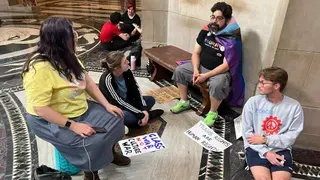October 2, 2014
Chicago's Silver Fork Gets LGBT'ers Cooking
Kelsy Chauvin READ TIME: 4 MIN.
There's a new wave of culinary talent breaking into the Chicago restaurant scene. But instead of the usual streams flowing in from the Windy City's Le Cordon Bleu and Illinois Institute of Art, the latest star chefs owe their success to the Center on Halsted.
The Center has long provided the LGBTQ community with social, legal, health, and other assistance for members and supporters. In 2011, it took things up a notch with Silver Fork, a nine-week vocational-training program for queer adults and straight allies ready to enter the culinary world.
Because the program is tuition-free, un- and under-employed students are welcomed from a wide range of social and economic backgrounds. The Center solicits applicants via Craigslist-an undoubtedly egalitarian approach-as well as through youth- and community-program referrals within the Center, and through local agencies that assist Chicagoans with housing and job readiness.
But the bottom line for all applicants, says the Center's Culinary Arts Manager Megan Sieberg, is that "everyone's goal must be employment."
In the four years she's run Silver Fork, Sieberg has seen the program and its students take enormous strides. Its first nine-week program barely filled all 20 available slots. Today, literally hundreds of budding chefs apply each year for the three cohorts-proof that the program is working, and filling a need in a hungry city.
The students, too, have grown their skills and connections with each session, while getting a leg up in Chicago's competitive restaurant environment.
"It's a really good opportunity to build skill and to network if you're interested in the culinary field," says Sieberg. "Yes, this is a social service, but it is a culinary program. Our staff instructor and all of our volunteers and alumni are really talented so it's a really good opportunity to learn new skills in a practical way."
Cultivating a Taste for Success
Part of Silver Fork's success is thanks to the leadership of Dan Smith, who helms the Hearty Boys restaurants and shares the celebrity-chef spotlight with his partner Steve McDonagh. (You may remember them from their Food Network show "Party Line with the Hearty Boys," among other endeavors.)
Smith was integral to getting the Center's Silver Fork program up and running, and remains active in its ongoing success. He still teaches menu planning and development to each cohort, alongside the dedicated chef instructor Sean Bush (himself a Hearty Boys veteran.) Pastry chefs, nutritionists, cuisine experts, alumni and other industry professionals also lend their expertise by volunteering as guest instructors and field-trip hosts.
Since most students start out pretty "green," according to Sieberg, each cohort learns the basics of a working kitchen. The curriculum spans everything from knife skills and sauces, to food safety and front-of-the-house etiquette. They eventually dive into more specialty cooking, such as breakfast, cakes and bread making. By the final weeks, students are practicing the advanced cooking techniques behind Japanese, Greek and other ethnic cuisines.
All that hard work pays off in the real world, with Silver Fork alumni regularly getting snapped up by Chicago restaurants-local favorites Central Kitchen & Tap, and Pastoral Artisan Cheese Bread & Wine among them.
"I always say that our program is only as successful as each individual student, and our program continues to grow like it does because of the amazing people graduating from it," says Sieberg. "They're getting these great opportunities because of the teaching and tools that they learned here."
Plus, Silver Fork alumni serve as advertising in the field. "They impress their employers. Employers will call me and say, 'I hired your Silver Fork people and I'd never heard of the program before, but they're great and I was wondering how I can get involved with you guys.'"
With ongoing grants and financial support from both local government and corporations like Kraft Foods and J.P. Morgan Chase, Sieberg hopes to eventually see a fourth cohort added to the program, bringing the yearly graduate count up to 120, though that might call for a training-kitchen expansion and the addition of newer professional-grade cooking equipment. The Center has also explored the idea of an on-site caf� that could serve as a potential revenue stream.
For Sieberg, one of the program's greatest assets is its diversity, in terms of age, sexual orientation and ethnicity, as well as educating students from all regions and backgrounds.
"It's a really inclusive environment," she says. "For LGBT-identified individuals and especially for the trans community, it's hard to find opportunities where you actually feel relaxed, where you can learn, and are surrounded by people who have your best interests in mind and provide a sense of community."
Sieberg recently left her post for graduate school, entrusting the role of Culinary Arts Manager to Cynthia Crook. But before she left, Sieberg added one departing note about Silver Fork for all the world's restaurateurs to know:
"Our students are so talented, they're good at what they do, and they work really hard. They're really hire-able. You want these people in your kitchen!"
Kelsy Chauvin is a writer, photographer and marketing consultant based in Brooklyn, New York. She specializes in travel, feature journalism, art, theater, architecture, construction and LGBTQ interests. Follow her on Instagram and Twitter at @kelsycc.




